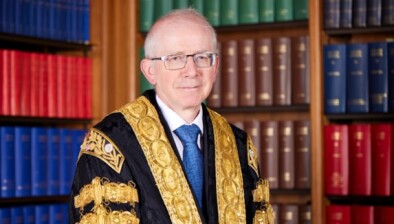UK: Political interference with judiciary condemned by former judges

Pictured (L-R): Lord Hope, Lord Cullen, Sir David Edward and Lord Sumption
A number of former judges have condemned the suggestion endorsed by Prime Minister Boris Johnson that judicial candidates be vetted by Parliament in a US-style process, our sister publication Scottish Legal News reports.
The suggestion in the House of Commons last week by the Attorney General Geoffrey Cox QC that “there may very well need to be parliamentary scrutiny of judicial appointments in some manner” has drawn swift criticism from distinguished former judges.
Speaking to Scottish Legal News, Lord Hope of Craighead, a former Deputy President of the Supreme Court and Lord President of the Court of Session, said the suggestion was “wholly misguided”.
He added: “The Supreme Court Justices were careful to explain in their judgment in the Cherry/Miller case that they were not pronouncing on political questions.
“The issues with which they were dealing, as is the case with all the other issues that come before them, were issues of law.”
The crossbench peer said that vetting “would risk politicising the office which they hold, in the minds of the public” and would be “contrary to the fact that political opinion plays no part in the work that they do”.
Lord Hope continued: “The guiding principle is that they decide cases according to the laws and usages of this country, and not according to such political views, if any that they might happen to hold.
“We have nothing to learn on this issue from what happens in the United States.”
Echoing Lord Hope, Lord Cullen, a former Lord President and Lord of Appeal in the House of Lords, said: “The suggestion that judges should be vetted by Parliament is devoid of merit.
“True to their oath of office, which they take in public, they have to be free from political sympathies. Vetting would imply that they might not comply with that oath.”
He added: “More fundamentally, vetting would open the door to political interference with the appointment of judges. This would damage public confidence in their independence and impartiality.”
Sir David Edward, who was a judge of the European Court of Justice between 1992 and 2004 and also sat as a temporary judge in the Court of Session, said: “Many judicial decisions have political consequences but it is a quite different thing to say judges have made decisions for political reasons.”
He added that the American judicial appointments process “demonstrates the malign effect of a system dependent on political or doctrinaire allegiance, on nomination by a politician, the president, and approval by politicians – the Senate. Many important issues are decided by a five-to-four majority depending on who appointed the justices”.
A poll by the right-wing ConservativeHome website found that 51 per cent of 1,225 respondents thought the Supreme Court should be abolished and the previous system of law lords restored, while 18.6 per cent thought that senior judges should be required to undergo confirmation hearings before Parliament.
Lord Sumption, who retired from the Supreme Court bench last year, told Scottish Legal News that the court “has done nothing that the old Law Lords would not have done in similar circumstances”.
He added that parliamentary vetting would be “both unprincipled and useless”.
It would be unprincipled because it would be “an overt attempt to stuff the court with political creatures, which would discredit any one appointed by such a method”.
It would be useless because “judges’ decisions are not influenced by their political views on Brexit or anything else, and because at confirmation hearings they would give the standard answer that US Supreme Court candidates now invariably do to the question how they would decide hypothetical cases, namely that they would have to listen to the arguments of the parties before they could know”.










